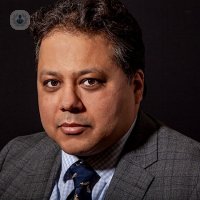How to treat a pinched nerve that’s causing neck, back and/or arm pain
Written in association with:If your neck and back pain are very persistent, you’ll be offered a range of non-surgical and surgical procedures to alleviate it. What could cause this pain? Should you consider surgery? Mr Dimpu Bhagawati answers these questions and more. Read on to learn from a leading UK orthopaedic spinal surgeon about how your pain can be resolved.

Symptoms of pinched nerves in the neck
The symptoms of pinched nerves in the neck can manifest in two slightly different sets. This creates two groups of patients.
When pain originates from a nerve
In one group, pain in the neck (usually the back of the neck) radiates down one arm to the hand. This causes pain and discomfort, as well as a stinging sensation in some fingers (or in some people, the entire hand). When it gets worse, it can lead to weakness in the hand, resulting in a lack of grip and difficulty writing or holding things.
When pain originates from the spine
When the pain and pressure originate from the spinal cord itself, not only a nerve, the pain can manifest in both arms. This can also manifest as
- Pain when walking a certain distance
- Bowel or bladder problems
- Balance problems and stumbling
- Loss of dexterity in both hands
Who is more prone to neck and back pain from pinched nerves?
Anyone can have neck and back pain from pinched nerves. I have operated on patients from a wide range of ages; from people in their 20s or 30s to people in their 80s.
- In younger patients (in their 20s, 30s and 40s), severe neck and back pain is usually caused by a soft disc bulge which pushes on a nerve. This results in a strong and awful pain down the arm and often, it negatively impacts their work lives.
- In older patients, the cause is often the overall wear and tear process that comes with ageing. When this happens, the space for the nerves in the spinal cord is narrowed.
How can my neck and back pain be cured (non-surgical methods)?
Typically, I will first offer non-surgical treatments to patients. For many patients, the symptoms will last a short time (two to three months) and will settle. Therefore, the first conversations regarding treatment are based on providing patients with information and advice on all their options.
In these conversations, I aim to emphasize the value of non-operative procedures:
- Musculoskeletal physiotherapy
- Standard pain killers
- Specific painkillers for spinal pain
- Spinal never injection
Spinal nerve injection is a day-case procedure and one that I frequently offer to early-stage neck and back pain patients. In this procedure, I put a needle right next to where the troublesome nerve is and inject local anaesthetic to calm inflammation. It’s quite a common procedure. Many patients choose this as an option and in most cases, they don’t need any further treatment.
When should surgical procedures be considered?
If a patient still experiences refractory pain (pain that cannot be controlled by usually effective methods), then we’ll suggest surgery with is a more aggressive approach.
What types of procedure are there?
Two surgical options for a pinched nerve are anterior cervical discectomy and fusion (ACDF) and cervical disc replacement. These are invasive procedures that involve making an incision and moving tissue to get to the back of the neck. This is performed under general anaesthetic, so the patient isn’t awake. For an insight into the ACDF
For Mr Bhagawati’s detailed explanation on the anterior cervical discectomy and infusion procedure, click here.
Mr Dimpu Bhagawati has spent years helping patients with their neck and back pain and performed countless procedures. Visit his profile to discover how he can help you.


